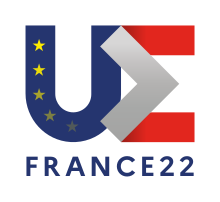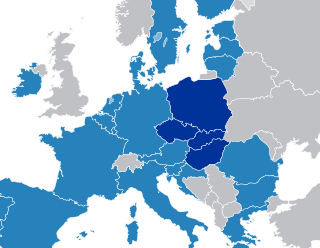
The Visegrád Group is a cultural and political alliance of four Central European countries: the Czech Republic, Hungary, Poland, and Slovakia. The alliance aims to advance co-operation in military, economic, cultural and energy affairs, and to further their integration with the EU. All four states are also members of the European Union (EU), the North Atlantic Treaty Organization (NATO), and the Bucharest Nine (B9).
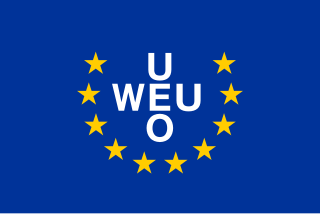
The Western European Union was the international organisation and military alliance that succeeded the Western Union (WU) after the 1954 amendment of the 1948 Treaty of Brussels. The WEU implemented the Modified Brussels Treaty. During the Cold War, the Western Bloc included the WEU member-states, plus the United States and Canada, as part of the North Atlantic Treaty Organization (NATO).

The High Representative of the Union for Foreign Affairs and Security Policy/Vice-President of the European Commission (HR/VP) is the chief co-ordinator and representative of the Common Foreign and Security Policy (CFSP) within the European Union (EU). The position is currently held by Josep Borrell Fontelles.

An EU Battlegroup is a military unit adhering to the Common Security and Defence Policy (CSDP) of the European Union (EU). Often based on contributions from a coalition of member states, each of the eighteen Battlegroups consists of a battalion-sized force reinforced with combat support elements. Two of the battlegroups were declared to be capable of being assembled for operational deployment at any one time.

The Group of Seven (G7) is an intergovernmental political forum consisting of Canada, France, Germany, Italy, Japan, the United Kingdom and the United States; additionally, the European Union (EU) is a "non-enumerated member". It is organized around shared values of pluralism, liberal democracy, and representative government. As of 2020, G7 members are the major IMF advanced economies and account for over half of global net wealth, 30 to 43 percent of global gross domestic product, and 10 percent of the world's population. Its members maintain mutually close political, economic, diplomatic, and military relations in global affairs.
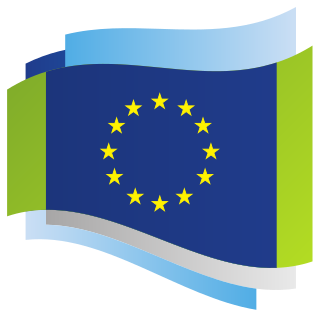
The European Defence Agency (EDA) is an agency of the European Union (EU) that promotes and facilitates integration between member states within the EU's Common Security and Defence Policy (CSDP). The EDA is headed by the EU High Representative for Foreign Affairs and Security Policy, European Commission’s Vice President (HR/VP), and reports to the Council. The EDA was established on 12 July 2004 and is based in Brussels, Belgium, along with a number of other CSDP bodies.

Relations between the European Union (EU) and the People's Republic of China (PRC) or Sino–European relations are bilateral relations that were established in 1975 between the PRC and the European Community. The EU is the PRC's largest trading partner, and the PRC is the EU's largest trade partner.
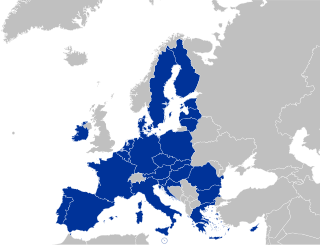
The Permanent Structured Cooperation (PESCO) is the part of the European Union's (EU) security and defence policy (CSDP) in which 26 of the 27 national armed forces pursue structural integration. Based on Article 42.6 and Protocol 10 of the Treaty on European Union, introduced by the Treaty of Lisbon in 2009, PESCO was first initiated in 2017. The initial integration within the PESCO format is a number of projects which launched in 2018.

On 28 February 2022, four days after it was invaded by Russia, Ukraine applied for membership of the European Union (EU). Ukrainian President Volodymyr Zelenskyy requested immediate admission under a "new special procedure", and the presidents of eight EU states called for an accelerated accession process. European Commission president Ursula von der Leyen stated that she supports Ukrainian accession, but that the process would take time. On 10 March 2022, the Council of the European Union asked the commission for its opinion on the application. On 8 April 2022, von der Leyen presented Zelenskyy with a legislative questionnaire, which Ukraine responded to on 9 May.

Emmanuel Jean-Michel Frédéric Macron is a French politician who has served as President of France since 2017. Macron is ex officio one of the two Co-Princes of Andorra. He previously served as Minister of Economics, Industry and Digital Affairs under President François Hollande from 2014 to 2016, and as Deputy Secretary-General to the President from 2012 to 2014. He is a member of Renaissance.
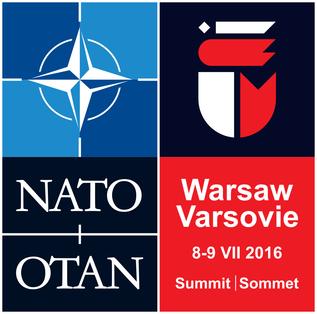
The 2016 Warsaw Summit of the North Atlantic Treaty Organization (NATO) was the 27th formal meeting of the heads of state and heads of government of the North Atlantic Treaty Organization, held at the National Stadium in Warsaw, Poland, on 8 and 9 July 2016.

This article outlines the history of the Common Security and Defence Policy (CSDP) of the European Union (EU), a part of the Common Foreign and Security Policy (CFSP).

The von der Leyen Commission is the current European Commission, in office since 1 December 2019 and is to last until the 2024 elections. It has Ursula von der Leyen as its president and it further consists of one commissioner from each of the member states of the European Union.
The European army or EU army are terms for a hypothetical army of the European Union which would supersede the Common Security and Defence Policy and would go beyond the proposed European Defence Union. Currently, there is no such army, and defence is a matter for the member states.
Strategic autonomy is defined as the ability of a state to pursue its national interests and adopt its preferred foreign policy without depending heavily on other foreign states.
The Versailles declaration is a document issued on 11 March 2022 by leaders of the European Union (EU) in response to the 2022 Russian invasion of Ukraine that had begun two weeks earlier. The document reaffirmed the EU's support for Ukraine, and outlined the union's plans for "bolstering defence capabilities, reducing energy dependencies and building a more robust economic base".

The European Political Community (EPC) is an intergovernmental forum for political and strategic discussions about the future of Europe, established in 2022 after the Russian invasion of Ukraine. The group first met in October 2022 in Prague, with participants from 44 European countries, as well as the Presidents of the European Council and the European Commission. It is distinct from both the European Union and the Council of Europe.

The First European Political Community Summit was the inaugural meeting of the European Political Community held on 6 October 2022 in Prague, Czech Republic. It was attended by the heads of state or government of forty-four European countries. Russia and Belarus were not invited.

The Second European Political Community Summit was a meeting of the European Political Community held on 1 June 2023 at Mimi Castle, Bulboaca, 35 kilometres from Chișinău, Moldova. It was attended by forty-five heads of states and governments, as well as leaders of European Union institutions.

The Third European Political Community Summit was a meeting of the European Political Community held on 5 October 2023 at the Granada Conference Centre in Granada, Spain.

